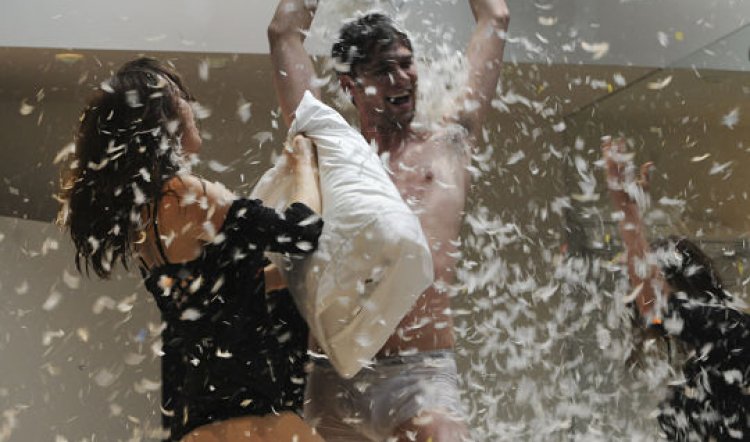
MEASURE FOR MEASURE
MEASURE FOR MEASURE Upstairs Belvoir St, 5 June-25 July, 2010; images by Heidrun Lohr
IN HIS PROGRAM notes, Benedict Andrews writes, “In the theatre, we ask actors to stand in for us, and as our substitutes, to show us how we have been, how we might be ” And in Shakespeare’s Measure For Measure what we have been and how we might be are not particularly pretty sights, albeit only too recognizable.
Known as the last of his comedies, although more bitter than sweet, Measure For Measure is rarely performed these days, probably because it’s difficult. It’s hard to find the right balance, tricky to extract the laughter without upsetting the pathos and besmirching the more serious subtext; and even more difficult to find the path through the minefield of possible melodrama and shock for shock’s sake. Between them, the creative team of director Benedict Andrews, designer Ralph Myers and an almost flawless cast has not only found that path, found the balance and honoured the play, they have also fashioned one of the most memorable, exciting and utterly absorbing productions of the year.
The plot is wildly convoluted and depends on a fair amount of suspension of disbelief. That said, its chain of swapped places, loves and positions won and lost, maidenhood threatened and manhood humiliated is as plausible in its outcomes in 2010 as it was in 1603, dealing as it does with justice, truth, tolerance and mercy. When the Duke (Robert Menzies) decides to temporarily quit the job and appoint Angelo (Damon Gameau) in his place. Predictably, the high-minded Angelo not only decides on a moral clean-up for Old Vienna but also to slyly demand the virginity of Isabella in return for her brother’s life.
Watching from the sidelines, disguised as a friar, the Duke is understandably dismayed by the simple evidence of how power corrupts and absolute poweretc. But he remains an observer as each action has its reaction and effect. Angelo’s moral zeal has immediate consequences for Mistress Overdone, a brothel-keeper, played by Helen Thomson, and her pimp, Pompey (Arky Michael). These two are superb comic actors and much of the night’s laughter is generated by them in both broad and subtle ways.
When it comes to laughter, Toby Schmitz is generally irresistible and, as the slanderous, priapic Lucio, he is in top form. Lucio is willing to say and do anything if it will assist his smooth and happy passage through life and that it all crashes around his ears with weary regularity is a gift to the actor. He also performs one of the most imaginative, lewd and hilarious combined sex act and guitar solo ever dreamed up; unfortunately it might totally queer your attitude to lilium longiflorum forever.
As Isabella, Robin McLeavy once again reminds why she is one of the most electrifying actors on the Sydney stage these days. Everything she does is understated and intelligent and this becomes ever clearer under the unflinching stare of this production’s most notable technical feature: cameras.
Intrusive video cameras are wielded at every turn by insistent operators (members of the cast) and when they’re not operating, surveillance cameras in the ceiling and behind the bathroom mirror are ready to capture the otherwise secret tics and private moments of the luckless residents of the Duke’s Vienna. And, accustomed as we are to attending to simultaneous visual stimuli (TV, phone, audio, spy lenses) as well as being privy to the hitherto private lives of celebs and the high and mighty, it isn’t remotely strange or difficult for the audience to divide its attention constantly between the action on stage and on the two large stage-side screens.

The production’s over-arching themes of movement and visual stimulation are further enhanced by the set which revolves often and often speedily. It is a hotel-style room with glass walls and a glass-walled bathroom in one corner. Opposite a large bed a flat screen TV silently displays the world weather and C-Span from Washington DC. It’s a comfortable yet impersonal interior where the disintegrating lives of its various inhabitants are on constant, often unkind, display. At the same time, the audience watches the watchers as they watch and the circularity of this heedless culture of casual yet intent scrutiny is at once unnerving and exhilarating.
Amid the swirling strands of plot and counter-plot and the constant spinning of the play’s location, the 12 members of the cast are choreographed on, off, in, out and through the space with thrilling purpose and insouciant precision. Costume designer Dale Ferguson, lighting designer Nick Schlieper, composer and sound designer Stefan Gregory and video designer and operator, Sean Bacon are integral to the overall spectacle and collectively they focus the audience’s attention and understanding on each successive step in the play’s progress.
This progress – and final destination – has been succinctly described by Harold Bloom (and quoted by Andrews in his notes) thus: “Shakespeare piles outrage upon outrage, leaves us morally breathless and imaginatively bewildered, rather as if he would end comedy itself, thrusting it beyond all possible limits, past farce, long past satire, almost past irony at its most savage.” On viewing this production you’d have to say he’s quite right.
Another key to this success is Colin Moody, in support as the kind of thug essential to upper class comfort, but in a key and outstanding scene as the drunken prisoner Barnadine, he epitomizes outrage and savage fury in a breathtakingly gutsy performance. Maeve Dermody, Ashley Lyons, Steve Rodgers, Chris Ryan and Frank Whitten also add their personal gravitas and technical skills to what is in many ways a powerful ensemble piece.
On opening night the only weak link in this otherwise outstanding production was a perilously unconvinced performance from Robert Menzies as the Duke. While the rest of the cast blazed with conviction and comprehension, Menzies did not. He appeared to be in a tearing, nervy hurry to spit out his lines, so they were frequently mangled and garbled. And they were just lines: he didn’t seem to feel or understand what he was saying. And it was all the more stark because he was surrounded by actors who so clearly did. Perhaps he’ll settle and slow down; you’d have to hope so because otherwise this Measure For Measure is magnificent.



